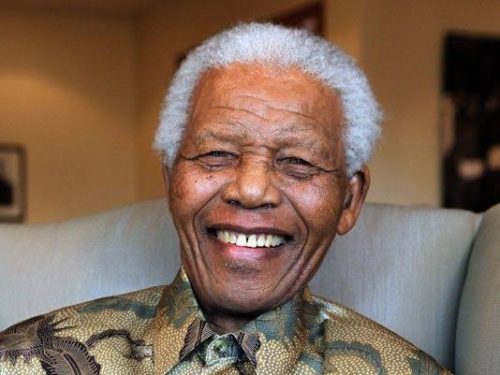Late former South African President Nelson Mandela may be no more, but his legacy still lives on. The first black president of South Africa has had a gold cast of his hands sold for a whopping $10 (£7m) in bitcoin.
Canadian crypto-currency exchange firm Arbitrade bought four casts from South African businessman Malcolm Duncan.
The firm said it planned to launch a global “Golden Hands of Nelson Mandela” tour to educate young people about the anti-apartheid icon’s life. This is the first time artefacts of Mr Mandela have been sold in bitcoin. Mr Mandela was jailed for 27 years for fighting white minority rule in South Africa.
He was released in 1990, and served as president from 1994 to 1999. Mr Mandela died in 2013 at the age of 95. He had turned into a global brand, with businessmen and artists cashing in on his name. Mr Duncan, who now lives in Canada, bought the casts from mining group Harmony Gold in 2002 for about $31,000. Half of the money paid to Harmony Gold was meant to go to charity, but it remains unclear as to whether that happened, Bloomberg news agency reports.
Harmony said it had “supplied Mr Duncan with the necessary paperwork verifying the provenance as requested by his attorneys,” but declined to comment on what happened to the donation, Bloomberg reports. The casts, which weigh around 20lb (9kg), include Mr Mandela’s hand, palm and fist. They are part of a collection meant to mark the years the former president spent in prison on Robben Island. The artefacts are believed to be the only ones left in the world.
The other sets of the collection were ordered to be destroyed by Mr Mandela, Mr Duncan told Bloomberg. It was part of the former president’s attempt to control his copyright after a number of scandals, including forgery allegations, arose around the sale of art bearing his image and name. Arbitrade has paid Mr Duncan a bitcoin deposit that has been converted to $50,000, and the rest is expected to be paid in quarterly installments of at least $2m, Bloomberg reports.
Bio On Mandela:
Nelson Rolihlahla Mandela (/mænˈdɛlə/[1], Xhosa: [xoliɬaˈɬa manˈdɛla]; 18 July 1918 – 5 December 2013) was a South African anti-apartheid revolutionary, political leader, and philanthropist, who served as President of South Africa from 1994 to 1999. He was the country’s first black head of state and the first elected in a fully representative democratic election. His government focused on dismantling the legacy of apartheid by tackling institutionalised racism and fostering racial reconciliation. Ideologically an African nationalist and socialist, he served as President of the African National Congress (ANC) party from 1991 to 1997.
A Xhosa, Mandela was born to the Thembu royal family in Mvezo, British South Africa. He studied law at the University of Fort Hare and the University of the Witwatersrand before working as a lawyer in Johannesburg. There he became involved in anti-colonial and African nationalist politics, joining the ANC in 1943 and co-founding its Youth League in 1944. After the National Party’s white-only government established apartheid, a system of racial segregation that privileged whites, he and the ANC committed themselves to its overthrow. Mandela was appointed President of the ANC’s Transvaal branch, rising to prominence for his involvement in the 1952 Defiance Campaign and the 1955 Congress of the People. He was repeatedly arrested for seditious activities and was unsuccessfully prosecuted in the 1956 Treason Trial. Influenced by Marxism, he secretly joined the banned South African Communist Party (SACP). Although initially committed to non-violent protest, in association with the SACP he co-founded the militant Umkhonto we Sizwe in 1961 and led a sabotage campaign against the government. In 1962, he was arrested for conspiring to overthrow the state and sentenced to life imprisonment in the Rivonia Trial.
Mandela served 27 years in prison, initially on Robben Island, and later in Pollsmoor Prison and Victor Verster Prison. Amid growing domestic and international pressure, and with fears of a racial civil war, President F. W. de Klerk released him in 1990. Mandela and de Klerk negotiated an end to apartheid and organised the 1994 multiracial general election in which Mandela led the ANC to victory and became President. Leading a broad coalition government which promulgated a new constitution, Mandela emphasised reconciliation between the country’s racial groups and created the Truth and Reconciliation Commission to investigate past human rights abuses. Economically, Mandela’s administration retained its predecessor’s liberal framework despite his own socialist beliefs, also introducing measures to encourage land reform, combat poverty, and expand healthcare services. Internationally, he acted as mediator in the Pan Am Flight 103 bombing trial and served as Secretary-General of the Non-Aligned Movement from 1998 to 1999. He declined a second presidential term and in 1999 was succeeded by his deputy, Thabo Mbeki. Mandela became an elder statesman and focused on combating poverty and HIV/AIDS through the charitable Nelson Mandela Foundation.
Mandela was a controversial figure for much of his life. Although critics on the right denounced him as a communist terrorist and those on the radical left deemed him too eager to negotiate and reconcile with apartheid’s supporters, he gained international acclaim for his activism. Widely regarded as an icon of democracy and social justice, he received more than 250 honours—including the Nobel Peace Prize—and became the subject of a cult of personality. He is held in deep respect within South Africa, where he is often referred to by his Xhosa clan name, Madiba, and described as the “Father of the Nation”.









No comments:
Post a Comment